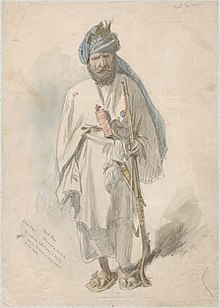|
ShinwariThe Shinwari (Pashto: شينواري) are an ethnic Pashtun tribe of Afghanistan and Pakistan. Among the greatest poets of the Pashto language in the 20th century was the late Ameer Hamza Shinwari, also known as "Hamza Baba".
The Shinwari tribe are descended from the Kasi Pashtun tribe settled in the southern districts of Nangarhar Province, in Haska Meyna, Achin, Rodat, Bati Kot, Kot, Chaprahar, Shinwar, Dor Baba and Nazian districts. A major portion of the tribe is centered in Jalalabad and Parwan province of Afghanistan, and Khyber Pass, Pakistan. These Shinwaris are mostly traders and businessmen. There are more than 3,000 Shinwaris settled in the Alizai village, 15 km away from Kohat, Pakistan. Mirdad Khel, a sub-tribe of the Shinwaris, migrated to Swat Valley during the 1750s and settled there. Among them one of the notable Shinwaris is Senator Abdul Rahim Mirdad Khel. In Afghanistan, the Shinwari are also located in the Kunar Valley. Reporting from 2010 states that there are around 400,000 Shinwari in Afghanistan.[1] LocationThe Shinwari tribe is settled in the southern districts of Nangarhar Province, in Haska Meyna, Achin, Rodat, Bati Kot, Kot, Chaprahar, Shinwar, Dor Baba and Nazian districts. A major portion of this tribe is also settled between Landi Kotal (Pakistan) and Jalalabad (Afghanistan), as well as in Parwan province of Afghanistan where they are concentrated in Shinwari, Ghorband, and Jabalussaraj districts. These Shinwaris are mostly traders and businessmen. There is also a significant minority of the tribe settled in Kohat and Hangu (Jangal Khel, Haji Abad, Mohallah Sangirh), Pakistan, a settlement 60 km south of Peshawar. In Afghanistan, the Shinwari are also located in Kunar, Bajaur Agency and Lower Dir. At Lower Dir, Munjai village contains a huge population of the Shinwari tribe, which had migrated from Afghanistan to Chamrakand (Mohmand Agency and Bajaur Agency) in the 1890s, and settled in the fertile land of Munjai village in Lower Dir. Reporting from 2010 states that there are around 400,000 Shinwari in Afghanistan.[1] The Shinwaris reside in hilly areas with narrow valleys such as in the Khyber Agency where mountain ranges meet there: Lacha Gar, Karagah Ghar, Surghar, Tor Ghar Morgah, and Kalauch. The famous Khyber Pass, at 1,180 meters (3,870 ft.) ASL, is the gateway to Afghanistan through the Kuh-e Sefid range.[2] The Khyber Agency has two major rivers. The Bara River in the southern Khajuri Plain provides for relatively arable farm land. The Kabul River forms the northern boundary, separating Khyber from Mohmand Agency. Another river in the agency is the Chora, which flows east-northeast on the north side of the Surghar range. Valleys: Maidan, Rujgal, Bara, Bazaar, Choora, Wachpal and Tirah.[2][3][4] Khyber Agency experiences hot temperatures during the summer season, May through August. Maximum temperatures may reach 104 degrees, while the lower average 79 degrees. During the cooler months of November through April, however, average high temperatures reach 64 degrees and lows dip to around 39 degrees. Average annual rainfall over the Khyber Agency is 15 to 16 inches[2] The elders of the Shinwari tribe in Nangarhar signed a pact, uniting against the Taliban. They promised that anyone supporting the Taliban, would be punished with fines and expulsion. This pact, which per The Times "appears to be the first" incident of an entire tribe declaring war against the Taliban, has invited comparison with the Sunni Awakening of 2006, which tipped the balance of power in Iraq against the Sunni insurgency. The pact also had economic implications that America offered over in development funding. Further, reports suggested the Shinwari were against Taliban interference with their traditional smuggling routes across the Pakistani border.[5] The security situation in Haska Mena district is getting worse daily due to the increased number of Taliban insurgents operating in Naria Aubo Village, Papen Village, Dara Village, Aughuz Village and other remote villages in the district, In December 2014, Most of the Taliban insurgents have changed from Taliban to ISIL-KP carrying out insurgent activities under the direct order of Abdul Khaliq, Who is the head of Taliban in Haska Mena. Several people were killed and injured during the insurgency in Haska Mena district, The most common are:[6]
HistoryBritish assessment (1885)In 1885, a British author described the Shinwari ("Shanwari" in his text):
Feuds and alliancesThe Shinwari tribe has been known to form alliances with the Mohmands, the Safis, and the Afridis. [8] However, some sources indicate that the Mohmand tribe is frequently in a state of conflict with the Shinwari tribe.[9]
Role in the Anglo-Afghan WarDuring the First Afghan War, a raid on the Shinwarree valley was conducted in Nangarhar, on the 24th of July 1842 Shinwari tribesmen skirmished with the British invaders and another action occurred in the 26th of July where a larger British Artillery force engaged the tribesmen.[11][12] Role in the Khost RebellionDuring the Khost rebellion, the Shinwari aligned themselves with the Afghan Government and helped quell the revolt. Role in 1929 Afghan Civil WarDuring the late 1928 riots, the Shinwari tribe were the first to openly rebel against king Amanullah Khan's imposition of various new laws, including the requirement to wear European dress, the rule that required them to send a quota of their daughters to Kabul for education and the impositions of taxes (they had never previously paid tax). The Shinwaris attacked Jalalabad, cutting off its water supply and closing the Kabul–Peshawar road. Amanullah responded by using his fledgling Air Force, including Soviet pilots, to bomb the Shinwaris. The use of foreign "infidels" to subjugate Muslims roused other tribes to revolt and the country descended into what would become the 1929 Afghan Civil War. TribeThe Shinwaris are derived from the Kasi tribe, and are further distributed into sub-tribes:[13]
Notable Shinwari
See alsoReferences
7. http://www.rawa.org/temp/runews/rawanews.php?id=656 8. http://afghanistantimes.af/old/news_details.php?page=8&id=9738&&cid=3 9. http://www.pajhwok.com/en/search/site/%22haska%22[permanent dead link] 10. https://sites.google.com/site/wwwbomnaforg/all-news-updates/news-updates-december-2013/clasheskill4ineafghanistan Archived 2016-05-06 at the Wayback Machine 11. http://www.kuna.net.kw/ArticleDetails.aspx?id=2348647&Language=en http://edition.cnn.com/2015/04/06/asia/npw-isis-reach-in-afghanistan/index.html |
||||||||||||||||||||||||||||||||||||||||||||||||||||||||||||||||||||||||||||||||||||||||||||||||||||||||||||||||||
